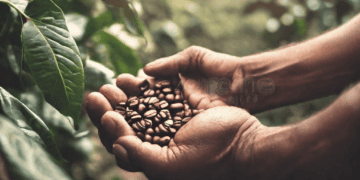Technology plays a crucial role in the coffee industry, affecting producers, traders, roasters, baristas, and consumers. Over the years, technological advancements have significantly influenced the sector’s evolution, starting from farm-level operations to various stages in the supply chain.
In the mid-20th century, technology began aiding coffee production, and since then, advancements in automation and equipment have continued. Presently, the industry focuses more on using technology to address critical challenges in coffee production, such as enhancing climate resilience in coffee plants and improving quality control measures.
To gain insight into the future implications of technological utilization in coffee production, industry professionals working with Sucafina, a sustainable farm-to-roaster coffee trader, provided valuable perspectives.
ENHANCING TRACEABILITY THROUGH TECHNOLOGY Transparency and traceability are pivotal in ensuring sustainability within the coffee industry. These concepts revolve around providing access to crucial production-level information, like prices paid to producers or specific land plots where coffee is cultivated.
Technology has long been employed to enhance transparency and traceability in coffee production. Blockchain technology, for instance, allows various supply chain actors to store data on a decentralized network, ensuring secure access for authorized parties while preventing data tampering.
Collins Mugabi, Sucafina’s Sustainability Business Analyst Manager, highlighted the use of Sucafina’s Cropin software, significantly aiding traceability. The software records detailed information about farms, including location, crops grown, certifications, and production history, enabling easy tracing of coffee batches to their origins.
Moreover, technologies like Cropin also help farmers gain better access to financing by maintaining transactional data, which creates automatic financial records useful for obtaining credit or loans.
STREAMLINING LOGISTICS AND MARKET ANALYSIS The complexities involved in coffee trade and export, like container shortages and rising freight prices, pose challenges. Sucafina is exploring new technologies to accurately track coffee shipments and improve communication among supply chain stakeholders.
Utilizing smart shipping containers integrated with Internet of Things (IoT) technology allows Sucafina to monitor real-time data and conditions of cargo, ensuring better transparency and risk mitigation throughout the supply chain.
Additionally, platforms like Cargoo facilitate streamlined communication among stakeholders involved in specific shipments, reducing reliance on excessive emails and simplifying the communication process.
AI-powered technology also plays a role in simplifying paperwork and analysis tasks, automating data analysis from various documents. Sucafina is testing analytics software to promptly assess how global events may impact the coffee market.
MEASURING ENVIRONMENTAL IMPACT Monitoring and measuring the environmental impact of coffee production is gaining significance among consumers. Technologies such as satellite tracking help in evaluating deforestation in coffee supply chains, addressing a significant environmental concern.
Sucafina collaborates with satellite tracking companies to identify deforestation in global coffee supply chains, utilizing remote sensing technology to monitor changes in land use over extended periods.
ADAPTING TO CLIMATE CHANGE With climate change impacting coffee farming, efforts are directed towards improving plant resilience. Research indicates potential shrinkage in suitable coffee farming land over the next few decades, necessitating adaptation strategies.
Lab-grown coffee, produced through molecular, microbial, or cellular methods, presents a potential adaptation solution. However, further research is required to ensure commercial viability and address its impact on various stakeholders in the coffee supply chain.
ENHANCING QUALITY CONTROL Technologies like ProfilePrint, an AI-powered food “fingerprint” platform, aid in determining the quality attributes of green coffee by analyzing molecular signatures. This technology simplifies quality assessment, providing more objective cup scores for various industry stakeholders.
Collaborative efforts within the industry, facilitated by technology, work toward establishing global quality control standards. Such technologies have the potential to democratize access to quality control information among producers.
The Future Outlook Technology stands as a powerful tool shaping a more transparent, accessible, and sustainable future for coffee production. Industry players need to adapt to technological advancements continuously to stay relevant and competitive. As new technologies emerge, the coffee industry can expect further transformation, hopefully benefiting coffee farmers worldwide.
In summary, technology’s evolving role in the coffee industry promises ongoing changes, but its precise impact remains dynamic and multifaceted as newer innovations emerge and integrate into existing practices.
Stay on top of supply chain news with The Supply Chain Report. Enhance your international trade knowledge with free tools from ADAMftd.com.
#CoffeeTech #Traceability #ClimateResilience #CoffeeInnovation #SustainableCoffee #SupplyChainTech #SmartLogistics #AIinCoffee #SatelliteMonitoring #QualityControlTech
















